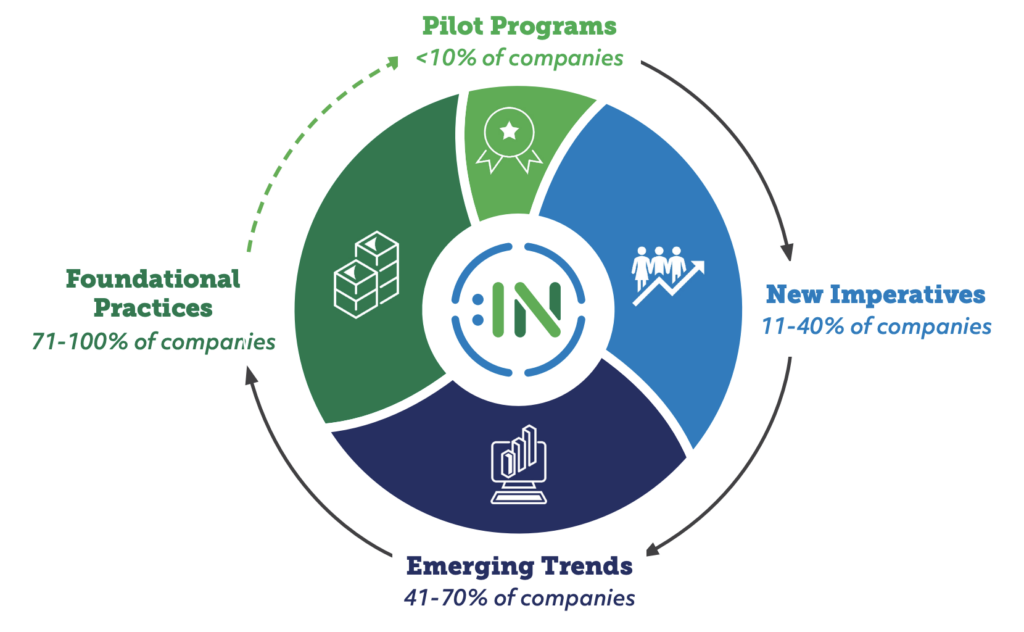Adoption & Advancement of Disability Inclusive Practices

The disability-inclusive practices measured by the DEI have been adopted by companies at varying rates. This framework for assessing the adoption and advancement of each practice breaks down into four categories: Foundational Practices, Emerging Trends, New Imperatives, and Pilot Programs. The graphic above illuminates the arc of maturity that traces disability inclusion initiatives from initial implementation as Pilot Programs through the process of becoming Emerging Trends and New Imperatives, until they are adopted as Foundational Practices, which are widely practiced by most DEI participants.
Foundational Practices

The journey toward sustainable corporate disability inclusion begins with the elemental programs and policies a company needs to effectively welcome and support people with disabilities.
The majority of DEI companies (71%-100%) incorporate the following Foundational Practices. Employment practices that have become nearly universal such as offering flexible work options, having a written accommodations policy, and encouraging confidential self identification are found in this section as are practices such as having a disability-focused E/BRG, providing philanthropic support to an external disability organization or event, and having a dedicated supplier diversity leader.
Foundational Practices Adoped by 71% to 100% of DEI Participants
Culture and Leadership
- 92% have a senior executive (within two levels of the CEO) who is a visible ally for the disability community (90% in 2022)
- 89% have an officially recognized
disability-focused Employee Resource
Group (ERG) or Affinity Group (88% in 2022) - 83% have a written statement of
commitment to Diversity & Inclusion that
specifically mentions disability (79% in
2022)
Community Engagement
- 88% provided philanthropic support to an external disability related event or organization in 2022 (88% in 2022)
- 85% have a formal program(s) in place to understand how to address the needs of the disability community (83% in 2022)
- 72% market directly to the disability
community by depicting people with disabilities in their internal or external marketing and/or advertising materials (70% in 2022)
Employment Practices
- 99% offer flexible work options (96% in 2022)
- 93% have a company-wide disability accommodation policy (93% in 2022)
- 93% encourage employees to
self-identify as a person with a disability (91% in 2022) - 91% include disability-focused information in new hire orientation (91% in 2022)
- 85% provide a wellness benefit(s) that extends beyond their EAP or mental health benefits (84% in 2022)
- 85% have employee retention
and advancement programs that focus on or include employees with disabilities (79% in 2022)
Supplier Diversity
- 84% have in place a Supplier Diversity Manager/Leader(s) who is dedicated to overseeing supplier diversity initiatives for their business (81% in 2022)
Emerging Trends

True leadership on disability inclusion requires more than simply doing most of the things most other companies are doing. Leading companies are leaning into the next wave of policies and practices that are gaining momentum inside corporations and setting an example that their peers can look to follow.
A growing share of DEI companies (41%-70%) incorporate the following Emerging Trends. This section features two Employment Practices, offering Interview candidates the option to request an accommodation and using data to track the hiring of people with disabilities, that are moving towards becoming Foundational Practices. A high concentration of accessibility policies and programs can also be found in this section with adoption rates higher than reported on the 2022 DEI, providing indications that corporate accessibility programs are beginning to become more widespread.
Emerging trends adopted by 41% to 70% of DEI participants
Culture and Leadership
- 57% have a company-wide external hiring goal(s) for people with disabilities (60% in 2022)
- 45% review the aggregate engagement survey results for employees who have identified as having a disability (40% in 2022)
Community Engagement
- 60% have a plan in place to ensure social media postings are accessible (55% in 2022)
- 59% supported or shaped disability-inclusion initiatives in calendar year 2022 (59% in 2022)
Enterprise-Wide Access
- 64% have a requirement to ensure digital products are accessible and usable by individuals with disabilities (62% in 2022)
- 62% have an accessibility expert(s) (internal or external) who can resolve accessibility and compatibility issues enabling employees with disabilities to use internal facing digital products (61% in 2022)
- 57% audit their external facing digital products for accessibility (54% in 2022)
- 55% are investing in internal and/or external innovative technology to advance digital accessibility (50% in
2022) - 45% have conducted usability studies to verify that the communications options work effectively with screen reading and other assistive technology (40% in 2022)
Emerging trends adopted by 41% to 70% of DEI participants
Employment Practices
- 69% make all job interview candidates aware of the option to request an accommodation(s) for the interview (61% in 2022)
- 68% use the numerical data to track progress in hiring people with disabilities (66% in 2022)
- 64% offer a Supplemental LongTerm Disability (SLTD) insurance benefit (64% in 2022)
- 58% have a centralized accommodations fund or allow managers to have a “budget margin” with disability accommodations expenses (55% in 2022)
- 53% offer paid caregiver leave to employees (51% in 2022)
- 52% require all people managers to take at least one (1) of the trainings for disability inclusion (51% in 2022)
- 51% have employees with significant disabilities who utilize supported employment programs (45% in 2022)
Supplier Diversity
- 56% have a written supplier diversity statement of commitment from a member of their senior executive team (CEO or two levels removed from CEO) that specifically mentions disability
(53% in 2022) - 50% had expenditures with certified disability-owned businesses (NA in 2022)
Non-U.S. Operations
- 64% have disability inclusive standards of non discrimination in the workplace that apply to all employees outside of the United States (64% in 2022)
- 44% have established chapters of their disability-focused Employee Resource Group (ERG) or Affinity Group outside the U.S. (42% in 2022)
New Imperatives

A disability inclusion strategy that is forward-thinking and responsive to the needs of an ever-changing workforce and customer base takes the perpetual development and deployment of cutting-edge programs and policies. These efforts require more than a charismatic, committed leader to succeed and sustain, they need a culture of inclusion that is woven into an organization’s operations and ways of working.
A smaller share of DEI companies (11%-40%) incorporate the following New Imperatives. This section features cultural commitments such as making disability an explicit component of senior executive evaluations and disclosures in external diversity reports as well as auditing internal digital platforms and Smartphone apps for accessibility. Supplier diversity practices such as including disability in council missions, having disability spend goals, and requiring Tier 2 spend with disability-owned suppliers are also examples of New Imperatives.
New imperatives adopted by 11 to 40% of DEI participants
Culture and Leadership
- 29% say disability inclusion is specified as a written component of diversity within senior executives’ performance evaluations (25% in 2022)
- 24% publish diversity report(s) that include data on employees who identify as having a disability (22% in 2022)
Community Engagement
- 34% have a smartphone app and have audited their app for digital accessibility (37% in 2022)
Enterprise-Wide Access
- 40% audit their internally facing digital products for accessibility (36% in 2022)
Culture and Leadership
- 29% say disability inclusion is specified as a written component of diversity within senior executives’ performance evaluations (25% in 2022)
- 24% publish diversity report(s) that include data on employees who identify as having a disability (22% in
2022)
Supplier Diversity
- 26% have a supplier diversity council or committee with a mission that specifically includes disability inclusion as an area of focus (24% in 2022)
- 25% have company-wide disability-focused goal(s) in place for supplier diversity and inclusion (27% in 2022)
- 22% require at least some of their prime suppliers to have expenditures with disability-owned businesses in their Tier 2 supplier diversity program (21% in 2022)
Pilot Programs

Today’s inspired and innovative ideas can often become tomorrow’s standard practice with the right level of visibility, support and long-term commitment.
Less than 10% of DEI companies incorporate the following Pilot Programs. Here you’ll find non-weighted practices focused on making disability a part of the board governance process.
Pilot programs adopted by <10% of DEI participants
Culture and Leadership
- 7% of documents that govern nominations of Directors on the corporate boards specifically mention the consideration of people with disabilities (10% in 2022)
- 7% have someone who openly identifies as having a disability serving on their company’s corporate Board of Directors (6% in 2022)
- 2% of companies publicly disclose or report on this information (2% in 2022)
Employment Practices
- 5% have an employee retention and advancement program(s) solely focused on employees with disabilities (5% in 2022)
Modernizing the Corporate Board
The DEI Takes on Boardroom Representation
In 2022, the DEI added three questions aimed at understanding the representation of people with disabilities at the board level. Companies can seek out, appoint, and report on disabled board directors to achieve their board-level diversity requirements and ESG goals.
Learn More by Checking out Board Are IN
Yes: 35 (7%)
No: 416 (84%)
No, but plan to within the
next year: 34 (7%)
Yes: 36 (7%)
No: 238 (49%)
Do Not Know: 211 (44%)
Yes: 10 (2%)
No: 25 (5%)
No, but plan to within
the next year: 1 (0.2%)
